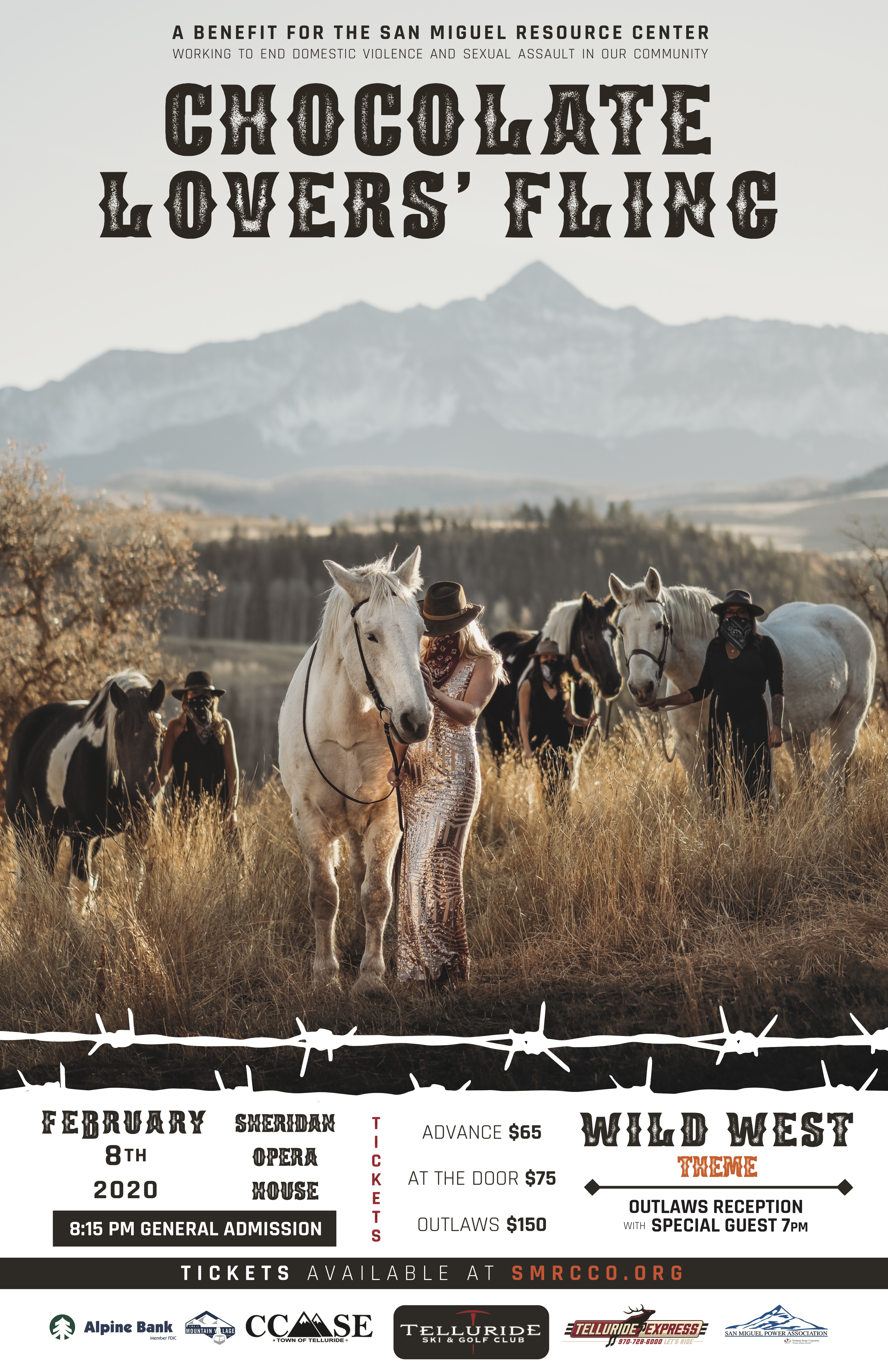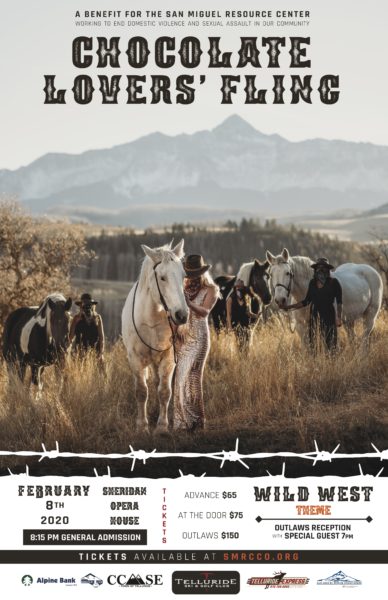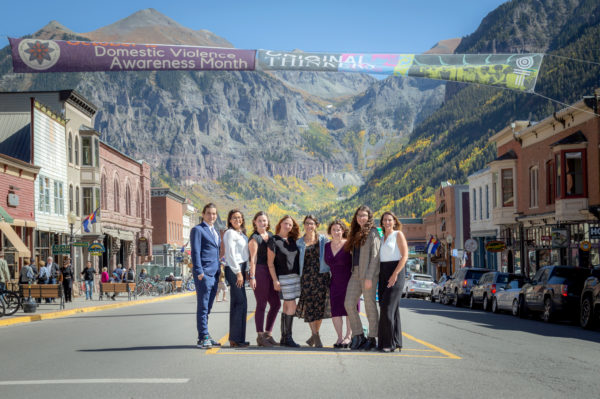
26 Jan SMRC’s Chocolate Lovers Fling: “Wild West/Country Western,”2/8
The San Miguel Resource Center‘s Chocolate Lovers’ Fling takes place at Telluride’s historic Sheridan Opera House on Saturday, February 8, starting at 7 p.m. for Outlaw VIP patrons; 8:15 p.m. for GA. Buy your ticket here now. (The price goes up at the door.)

Chocolate Lovers Fling: “The Wild West/Country Western”:
Truth is the cowboys and pioneers of America’s mythic Wild West generally smelled like week-old, wet laundry – and worse.
According to one online source, most men and women pioneers went months without taking a bath and were ok with their stench. Native Americans, accustomed to the elements and the unforgiving heat, washed regularly, far more frequently than the emigrants, and were repulsed by the hygiene of the invaders.
That vision western movies gave us all of a single wagon slowly making its way on rugged terrain? Just that: a vision. In reality, the masses moving towards the frontier traveled in groups of hundreds of wagons on dirt roads, creating large clouds of dust that turned day into night, especially for those poor souls at the end of the line.
The Wild West rhymes with spaghetti westerns – also with “Lawrence of Arabia” – at least in one key respect. In the early 1800’s, American authorities came to believe camels could easily adapt to harsh western conditions. In 1843, the US camel corps was formed after authorities imported some 66 healthy camels from Egypt and Morocco. However, during and after the American Civil War a large number of camels were either killed or ran into the wilderness. Some were captured for the circus. Last time anyone saw a camel in the west was in Texas in 1941.
Cowboys hats were the single most recognizable symbol of the Old West. In reality, that signature piece of headgear was not practical.
What’s more, the myth of the lawless West began before the period was over. Dime-store novels written in the East in the latter part of the 19th century exaggerated, or simply invented, stories about the crimes and criminals. Hollywood later perpetuated the myth, feeding the public’s desire for excitement and adventure with stories of gunfights in the street and stagecoach robberies.
Truth is, yes, there was violence in the mountains, plains, and frontier towns of the old west, but, as with any wilderness, a man was just as likely, if not more likely, to die from thirst, starvation, drowning, freezing, snakebite, falling off a mountain, falling off his horse, being attacked by animals, or any one of a hundred other things. As unromantic as it may be, relatively few people in the Wild West were involved in the mayhem immortalized in the movies.
Bottom line: Enormous popular attention was focused on the Western US in the second half of the 19th century and the early 20th century, from the 1850s to the 1910s, a period sometimes called the “Old West” or the “Wild West.” But the story of the Old West is really relatively tame – and somewhat boring.
Anything but boring, however, is when the Wild West (and Country Western) meets the San Miguel Resource Center at the 25th annal Chocolate Lovers Fling, where guests are invited to channel their inner Willie, John Wayne, Jimmie Rodgers, Johnny Cash, any one of the Carter clan, or Dolly Pardon and ride in on their – uh, camel – strumming away – (or not).
The event, which promises all the strong characters, action, and drama of the (mythic) Old West, takes place Saturday, February 8, at Telluride’s historic Sheridan Opera House (a venue which dates back to the wild and woolly gold-digging days of the town, once the stomping grounds of badass bankers, Bible thumpers, bandits, and gold-diggers of all stripes – and cowboys).
The evening includes a live band playing Country Western, line dancers, and decadent chocolate confections.
“To kick off we will host the Outlaw “VIP” reception beginning at 7pm where we will feature guest speakers. For the record, The Outlaw Bar is generously sponsored by Slate Gray Gallery and Exceptional Stays,” explained Fling organizer and board member Ana Coe Bowling, continuing:
“We will also host an awesome band: Young Country hailing from Phoenix. Young Country has been a country music staple in the southwest for years. Consistently in high demand, Young Country maintains a busy schedule entertaining some of the most established corporations in the world. Playing the best of current and past country hits, Young Country can easily incorporate any genre into the mix to round out the night and keep people dancing. New Leaf Design donated their talent and decor, complete with lounge vignettes, lanterns, and cowhides. Ben Eng will be on hand with his ever popular photo booth.”
“The boys from Young Country are just plain good…Rival any national act I’ve ever heard…Great musicianship,” said Ronnie Dunn of Grammy Award-winning Brooks & D.
Featured chocolate chefs include: Martha Graner and Eliza Gavin of 221 South Oak Bistro; Sleighs and Wagons; La Cocina; Pandora Catering; and Telluride Private Catering and others.
Cali G., winner last year with her alfajores, will be showcased during the VIP Reception.
Proceeds from the Fling, which, with all its moving parts, demands hundreds of man hours to cobble together, represent a big chunk of the Resource Center’s fundraising budget, about one-third. Proceeds raised at the party are particularly important because they are unrestricted.
Unrestricted funds – as opposed to restricted funds through grants from government entities, which come with strings – allow the nonprofit to meet the ever-changing needs involved in crisis response and provide better ongoing healing and empowerment opportunities for its clients.
“During the VIP Outlaw Reception, we will be raising funds to help pay for therapy for survivors of domestic violence, sexual assault and other crimes. Everyone responds to trauma differently, but many of our clients find therapy to be a helpful part of their healing process. Unfortunately accessing affordable mental health care can be difficult. We try to reduce this barrier by paying for six sessions of therapy. During 2019 we spent nearly double our budget for therapy because we do not believe in turning survivors away. Because of the high demand and importance of this service, we are specifically raising funds during this event to expand our budget for therapy and hopefully increase the number of sessions we can pay for. We will have survivors speak during the VIP reception not only about their experience, but also about the benefit of therapy in their journey towards healing,” said Riley McIntrye, executive director, San Miguel Resource Center.
The San Miguel Resource Center, updates:
Think of the theme as the Wild West/Country Western meets the Westworld of interpersonal violence. One of the best parties of Telluride’s winter season, the Fling takes place just six days before Valentine’s Day, this year on February 8.
The choice of that date is significant.
Now celebrating 26 years of community service, the Resource Center is the Telluride region’s only nonprofit that deals with interpersonal violence and, like High Holy Day of Lovers, it celebrates healthy relationships. In fact, the goal of the San Miguel Resource Center is to become so effective in our neck of the woods, its services will no longer be needed.
The Resource Center defines abuse as anything from a vague feeling something is wrong to battering and worse – much worse. Specifically, according to the Resource Center’s executive director, Riley Mcintyre:
“Domestic violence is the willful intimidation, physical assault, battery, sexual assault, and/or other abusive behavior as part of a systematic pattern of power and control perpetrated by one intimate partner against another. It includes physical violence, sexual violence, emotional abuse, financial abuse, and much more.”
It is important to note, as the above definition states, domestic violence includes much more than physical violence.
“There are many non-physical tactics to control an intimate partner, and these can be more damaging over time. Also, abuse is willful, not a loss of control or caused by alcohol. Finally, domestic violence does not discriminate; it can affect people of all socioeconomic backgrounds, all cultures, any gender identity, or sexual orientation.”
The services of the San Miguel Resource Center are completely free and confidential, and available to anyone affected by interpersonal violence, with a focus on sexual assault and domestic violence.
“We are not here to tell people what to do, and someone does not have to have reported anything to law enforcement in order to receive our services. People sometimes call just to ask questions for a friend, while others start a journey in which they access every service and fund in order to establish a safe new home for themselves and their family. We are here to support survivors on any path they choose.”
Each Resource Center survivor has had a different experience and therefore has different needs:
“Our services are client-directed and client-driven. Staff is here to help clients safety plan, set goals, and connect with other resources, which could include accompanying them to court or the doctor as well as obtaining legal assistance, therapy and/or housing. As advocates, we listen, we believe and we support,” added McIntrye.
Resource Center, by the numbers:
In 2019, staff from San Miguel Resource Center served 183 unique clients.
The non-profit provided $48,184 in emergency financial assistance funds to survivors of interpersonal violence; $20,595.75 of these funds were paying for therapy sessions.
“We had to limit people to six sessions each because of the increase in demand, so at the Fling we are, as we said, specifically raising money to be able to increase our budget for therapy,” explained Mcintyre.
In addition, the Resource Center:
• Trained 22 new volunteer advocates from Telluride and the West End
• Volunteer advocates donated 6,658 hours of their time to staff our 24-hour helpline
• Safe-housed 17 survivors for a total of 59 nights
• Presented 403 violence prevention workshops in our 9 local schools
San Miguel Resource Center: Staff

“Since last year’s Fling we have had two spectacular new people join our team,” said Mcintyre.
Ainslee Fessenden recently relocated to Western Colorado and joined SMRC. In her role as Client Services Manager, she oversees programming and client-facing services, ensuring that the Center is implementing best practices and truly serving and empowering survivors.
Fessenden completed her Masters of Social Work at the University of Texas at Austin with a concentration in Administration and Policy Practice and holds a bachelor degree in Peace and Conflict Studies from the University of California at Berkeley. Originally from Northern California, she worked in college on access for immigrant and first-generation students in Washington, DC before pursuing her MSW.
Fessenden’s professional experience has revolved around youth and leadership development, multidisciplinary collaboration, and building bridges between research and practice. She is passionate about social change and generating equity across systems.
“Fessenden has brought an amazing skillset to the Client Services Program,” added Mcintrye.
Temojai Inhofe moved to the Western Slope in the summer of 2018 with her daughter.
Inhofe received her undergraduate degree in Philosophy from the University of California, Santa Barbara and her J.D. from the University of San Francisco. She went on to practice law in both Oregon and California, is dedicated to volunteerism and advocacy and is bringing her passion for public service to the Resource Center.
Inhofe now lives in Norwood and is the new Rural Victim Advocate. She staffs the Center’s Norwood and Nucla offices and jumped right into providing exceptional services to clients. In exciting news, this position became full time in 2020, allowing the Resource Center to continue enhancing services and outreach in the West End.
Other staffers continue to do impactful things with their programs.
Claudia Garcia has been partnering with the Latinx Advocacy Committee to develop and facilitate trainings on diversity, equity, and inclusion for various organizations throughout our community. The Resource Center actively promotes inclusion throughout its entire community because interpersonal violence is rooted in oppression.
Additionally, Marissa Lampe, Prevention Educator, and Bebe Bischoff, Advocate Coordinator, have piloted a new peer advocacy program, which provides high school juniors and seniors with the skills to support their peers around topics like consent, setting boundaries and healthy relationships.
Fessenden is working to reinvigorate the Sexual Assault Response Team, in preparation for implementing a new federal grant to bolster services for survivors of crime specifically in rural communities. Angela Goforth, the Director of Grants and Finance, worked diligently to obtain this new funding source along with a new grant from the Rocky Mountain Health Foundation.
Chocolate, a brief history:

Chocolate’s history dates back at least 1,500 years, when the Mayans of Central America crushed cocoa beans into an unsweetened beverage. The Aztecs had a name for that beverage: xocolatl or “bitter water.” The Aztec ruler Montezuma is said to have consumed 50 or more golden goblets of the elixir every day. Today, the consensus among doctors trained in integrative medicine is that dark, organic is Montezuma’s gift to the world. Consumed in moderation, dark chocolate is good for body and soul. Chocolate helps boost serotonin and endorphin levels in the brain that improve mood and enhance pleasure. Like red wine, certain fruits and veggies, dark chocolate is also known to be rich in antioxidants.
Bottom line: Enjoying decadent chocolate morsels at the Fling is a win-win. The taste treat makes you feel better and get healthier while supporting the San Miguel Resource Center’s efforts to support healthy relationships.
San Miguel Resource Center, more:
The Resource Center was called Tomboy House when it was first formed in 1992 by a group of locals, including Bev McTigue, Dr. Marshall Whiting, Dr. Susannah Smith, and Marsha Ewell.
By 1994, Tomboy House had established a 24-hour hotline to help victims through crisis intervention and referrals. That year, the nonprofit served 28 clients. Last year that number was nearly 10x higher: in 2018, the San Miguel Resource Center served 205 clients with 238 victimizations.
These days, in addition to crisis intervention and a hotline for Telluride, Norwood, Nucla/Naturita, the SMRC provides a wide range of programs/services in English and in Spanish, including cultural outreach, advocacy to help clients with court and medical services, safe housing, preventative community education, and awareness initiatives.
Ways you can help:
Attend the Fling Saturday, February 8, 2020.
Volunteer. Become a certified advocate or simply help with the many events that take place throughout the year such as the Fling. Learn about domestic violence and sexual assault. Education is the key to dispelling myths, ending the blaming of victims and preventing future violence.
Visit www.sanmiguelresourcecenter.org to learn more about how you can help and to buy tickets to the Chocolate Lovers’ Fling.
More about Ana Coe Bowling:

Ana Coe Bowling
Ana Coe quickly emerged as a highly competent and accomplished real estate professional.
Possessing over 25 years of extensive experience in a variety of roles across consumer luxury markets, Coe is also an astute specialist in sophisticated brands.
Prior to moving to Telluride in 2009, Coe lived in New York City during which she worked for Armani and Estee Lauder, respectively. She ultimately owned and ran a premier fashion buying office, scouting and purchasing for women’s high-end boutiques and department stores both domestic and international.
She has since worked for LVMH, and as Managing Partner of Soirée Telluride, the premier wedding planning business in the region.
When Ana Coe isn’t working hard to turn her clients’ dream events into reality, she enjoys yoga, skiing, and hiking with her husband, Matt Bowling.
Coe is extremely active in the Telluride community, where she is a mentor and board member with the One to One program, a board member of the San Miguel Resource Center, and volunteers with other multiple local nonprofits.


Sorry, the comment form is closed at this time.